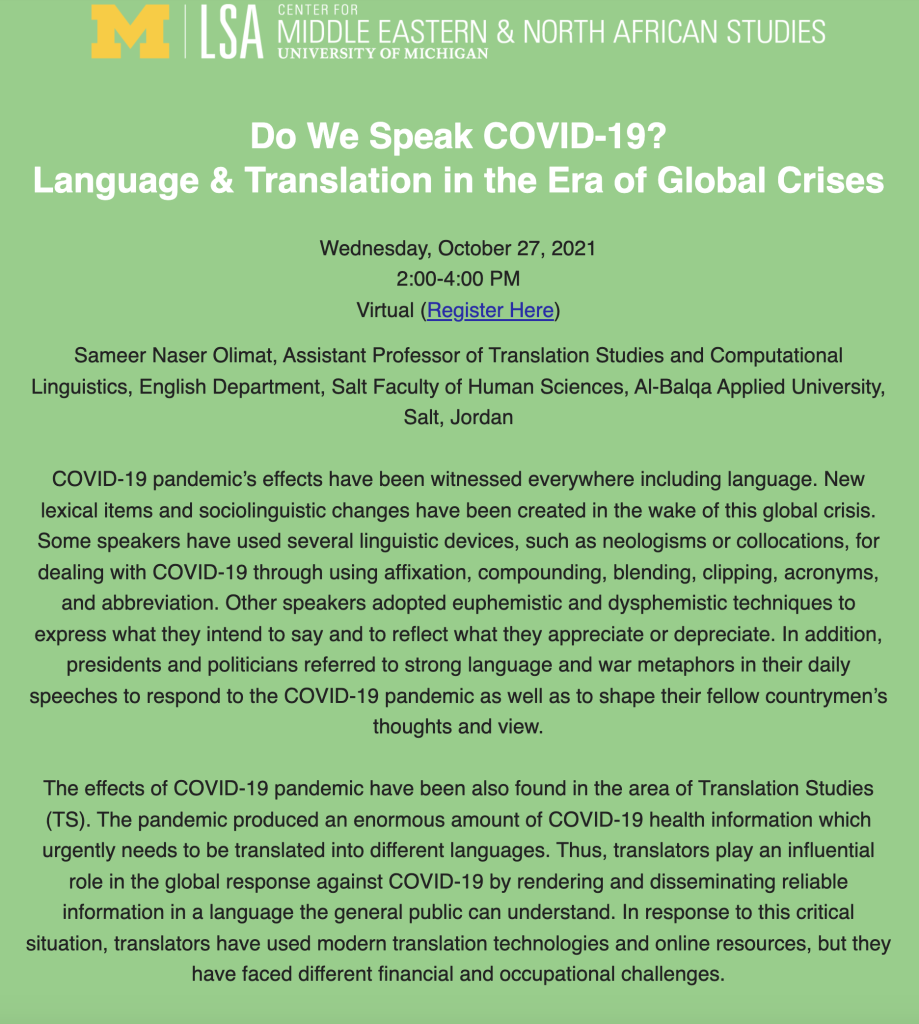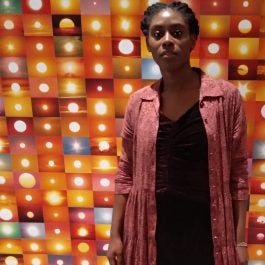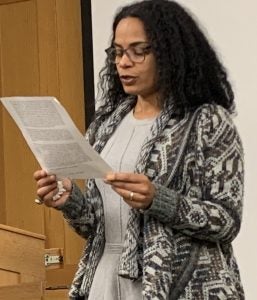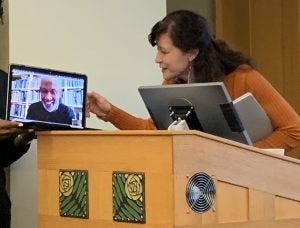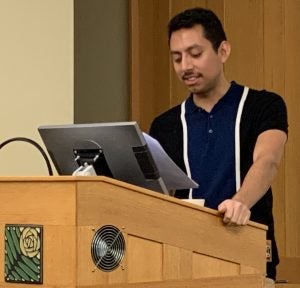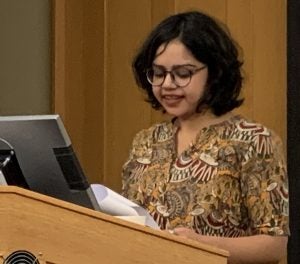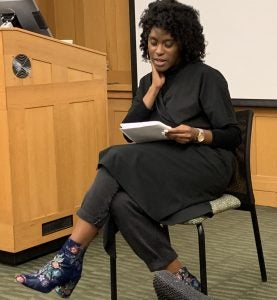
Author Archives: Yopie Prins
Do we speak Covid-19? Language & Translation in the Era of Global Crisis
Absinthe, Volume 26: readings from VIBRATE! Resounding the Frequencies of Africana in Translation
On December 6, 2019, the Department of Comparative Literature at the University of Michigan hosted a reading to preview Volume 26 of Absinthe: World Literature in Translation, entitled VIBRATE! Resounding the Frequencies of Africana in Translation.
The new issue is co-edited by Imani Cooper Mkandawire and Xiaoxi Zhang , both Comparative Literature PhD students, together with UM Professor Frieda Ekotto.
Absinthe 26: VIBRATE! contemplates the implications of Africa and its diasporas in translation, moving through various temporalities and mediums and languages, including Lugosa, Kamba, English, French, Swahili, Arabic, Adinkra Symbols, visual codes, and digital languages.
The reading began with excerpts from “The Art of Looking: A Letter by Frieda Ekotto to Frida Kahlo,” translated by Emily Goedde (UM ’15 PhD in Comparative Literature).
The essay was read in French by UM Professor Benedicte Boisseron and in English by Comparative Literature PhD student Sahin Acikgoz.
The Kenyan writer Abdilatif Abdalla magically appeared on screen from Germany to read from poetry translated together with UM Professor Kelly Askew.
Listen here to Abdalla’s reading of “Kibaruwa” in Swahili, followed by Askew’s reading of “Casual Laborer” in English.
UM Lecturer Nyambura Mpesha also presented selections from her poetry featured in Absinthe 26.
Listen here to Mpesha’s reading of “M-Diag” in Swahili and her explanation of how she translated her poem into English. Dedicated to her students, the poem is a warning not to step on the Block M embedded in the diagonal sidewalk in front of the University of Michigan Library…it’s bad luck!
Other Comparative Literature PhD students also participated in the reading. Alex Aguayo introduced all the presenters and Shalmali Jadhav read Merit Kabugo’s English translation of “The Unending Game” by Susan Kiguli.
Works by Afua Ansong and Mary Pena were read by Imani Cooper, who ended the program with a powerful reading of her own poem, “Inheritance: Ode to N’TOO.”
The online issue of Absinthe 26: Vibrate! is available here and advance orders for print copies can be placed here.
For more information about the journal, published by the Department of Comparative Literature at the University of Michigan, go to Absinthe: World Literature in Translation
Yopie Prins speaks at Rutgers University about Translation Initiatives at Michigan
A TALK ON TRANSLATION STUDIES INITIATIVES
https://comparative-lit.blogs.rutgers.edu/2018/11/a-talk-on-translation-studies-initiatives/
By Coco Xu
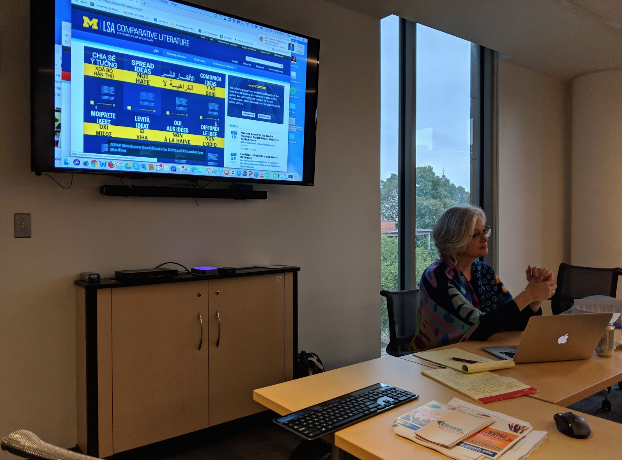
On October 15th and 16th, Dr. Yopie Prins, chair of the Comparative Literature department at the University of Michigan and former president of the American Comparative Literature Association, visited Rutgers and gave two talks on the history and current state of Translation Studies at UM.
Dr. Yopie Prins developed her academic interest in translation studies from her Dutch-English bilingual experiences and studies at the University of Amsterdam, where she was influenced by James S. Holms’s book, The Name and Nature of Translation Studies. As chair of the Comparative Literature department at UM, she is committed to promoting critical translation studies at both the undergraduate and the graduate levels. Dr. Prins believes that translation moves not only between languages, but also between different media, disciplines, and cultures.
Utilizing multilingual resources among students as well as faculty members, UM Comp Lit launched a translation semester to publicize translation on campus in 2012, with $20,000 in funding from the humanities dean’s office. The translation semester featured courses, lectures, as well as other translation-themed activities. During the semester, the department offered an undergraduate course—“22 Ways to Think about Translation”— which encouraged students to think about translation across disciplines and in their daily lives. Events that took place during the semester included a global Arabic poetry reading, a public screening of the film “Speaking in Tongues,” the staging of a performance play called “Translations,” and translation contests. In order to make translation visible not only on campus and within language and literature departments, translation semester reached out beyond literary translation and included topics like machine, scientific, and professional translations. A panel titled “Words without Borders” invited students to discuss translation for a digital age, and a talk by Josh Estelle, lead developer of the Google Translate project and former graduate from UM, culminated in a translation competition between live translators and Google Translate.
Collaborating with language programs and the Language Resource Center, Comp Lit at UM was able to carry out translation projects including the Language Bank, Translate-a-thon, and community translation services. While language programs brought the Language Bank into language classrooms, the Language Resource Center acted as a matchmaker to connect community organizations with student translation volunteers. The Translate-a-thon, a working group for collaborating translators from all departments across campus to meet weekly at Comp Lit, allowed translators to team up and work together to utilize their unique linguistic expertise. The Translate-a-thon at UM proved to be a great success; drawing both graduate and undergraduate students from different departments and disciplines, it grew from the initial 30–40 to over 200 regular participants in just a few years. It has also reached beyond the immediate community, through engaging international Fulbright scholars via Skype and maintaining a support team on an online forum.
Following the successful translation semester, UM Comp Lit launched a Translation Studies minor in 2014. Open to students from all departments, the TS minor builds translation into the language department curricula and promotes more advanced level work in critical translation studies. Through required capstone projects, it promotes experiential and engaged learning and extends efforts of community outreach. According to TS minors, the program has provided them with not only relevant internship experiences but also a chance to reflect on their translation practices.
Beyond the undergraduate level, UM Comp Lit also extends its initiatives in critical translation studies to the graduate level. Absinthe—a magazine published by the University of Michigan Press—provides the platform where graduate students propose thematic issues and publish their translations and critical reflections on translation. The magazine also gives interested graduate students a chance to develop professional skills in editing and networking with writers and publishers. UM Comp Lit also houses a graduate translation workshop centered around a translation club called “Cannon translation review”. Through these working groups and clubs, UM Comp Lit connects area studies departments to form intra-departmental and extra-departmental collaborations among graduate students through translation studies. Similar to the undergraduate minor in TS, a graduate certificate program in TS is offered. Moving forward, UM Comp Lit is experimenting with a post-doc position in critical translation studies and hopes to collaborate with their law school to develop TS projects on translation in the multilingual midwest and translation in and outside of universities.
Dr. Prins’s talk drew faculty and students from all humanities departments at Rutgers. In the Q&A session, Prof Andrew Parker from the Comp Lit program at Rutgers pointed out that over 54% of the student population here at Rutgers speak a different language at home with their parents/grandparents. Learning from the successful experience of the critical translation studies initiatives at the UM, Rutgers humanities departments is also thinking about ways to address the multilingual backgrounds of our population and interests in critical translation studies here in New Jersey.


